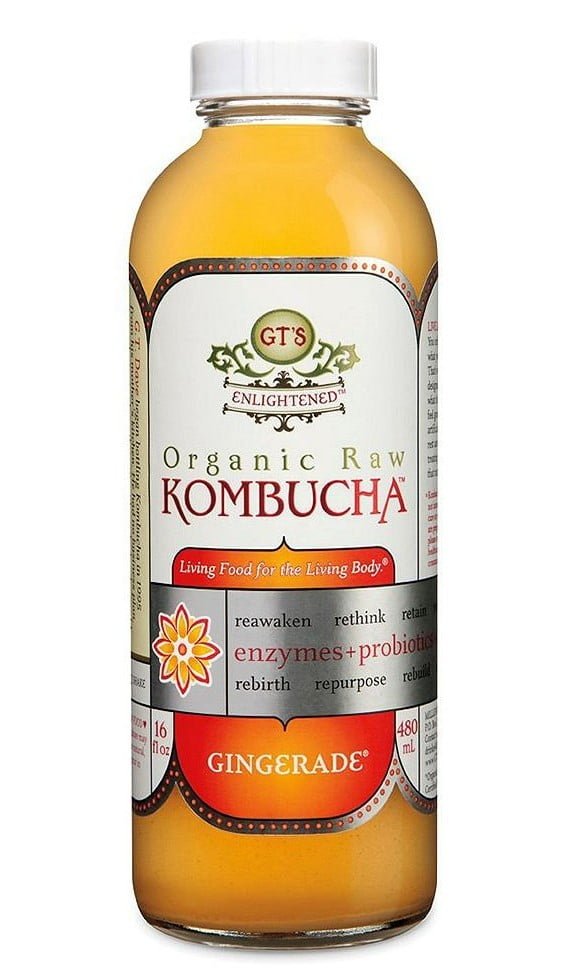In recent years, natural remedies have gained immense popularity as a way to improve overall health and wellness.
Two of the most popular natural remedies are Apple Cider Vinegar (ACV) and Kombucha. Both of these remedies have been claimed to offer numerous health benefits and have been used for centuries for their medicinal properties.
This article aims to compare and contrast Apple Cider Vinegar and Kombucha in terms of their health benefits, taste, and ease of use, and provide recommendations for those who are considering adding these remedies to their diet.
By the end of this article, you will have a better understanding of the pros and cons of each remedy, and which one is best suited for you.
What is Apple Cider Vinegar (ACV)?
Apple Cider Vinegar, commonly known as ACV, is a type of vinegar made from fermented apples. The apples are crushed and the juice is extracted, then yeast is added to the juice to ferment the sugars and turn them into alcohol.
Finally, bacteria are added to ferment the alcohol into acetic acid, which is the main component of vinegar.

Apple cider vinegar has been used for centuries as a home remedy for various health issues. It has a tangy and sharp taste, which makes it a popular ingredient in dressings, marinades, and sauces.
However, it is also consumed as a health tonic and many people believe that it can offer a range of health benefits.
Health Benefits of Apple Cider Vinegar
One of the most well-known health benefits of ACV is its potential to aid in weight loss. Some studies have shown that consuming ACV can help reduce belly fat and improve insulin sensitivity, which can lead to weight loss.
ACV has also been shown to improve digestion by promoting healthy gut bacteria, reducing bloating, and reducing constipation.
ACV has also been shown to have potential benefits for blood sugar control. Studies have found that consuming ACV before a meal can help reduce the spike in blood sugar levels after eating, potentially helping to improve insulin sensitivity and reduce the risk of type 2 diabetes.
Here is a list of health benefits of Apple Cider Vinegar:
It’s important to note that while there is some research to support the health benefits of ACV, many of the claims are not supported by strong scientific evidence. As with any health supplement, it’s crucial to talk to your doctor before adding ACV to your diet, especially if you have any health conditions or are taking any medications.
What is Kombucha?
Kombucha is a fermented tea beverage that has been consumed for thousands of years in Asia and is now gaining popularity in other parts of the world.

It’s made by fermenting tea, sugar, and a symbiotic culture of yeast and bacteria known as a “SCOBY” (Symbiotic Culture of Bacteria and Yeast).
Health Benefits of Kombucha
Kombucha has been touted for its various health benefits, including:
- Probiotics: Kombucha contains live bacteria and yeast that can help promote a healthy gut microbiome, which can improve digestion and support the immune system.
- Improved gut health: The probiotics in kombucha can help reduce inflammation in the gut, which can improve overall gut health and reduce the risk of conditions such as irritable bowel syndrome and inflammatory bowel disease.
- Increased energy: Some people report feeling more energetic after drinking kombucha, although more research is needed to understand why this may be the case.
- Antioxidant effects: Kombucha contains antioxidants that can help protect against cell damage caused by free radicals and reduce oxidative stress in the body.
- Improved joint health: Some studies have shown that kombucha may help reduce inflammation and improve joint health, although more research is needed in this area.
As with ACV, it’s important to talk to your doctor before incorporating kombucha into your diet, especially if you have any health conditions or are taking any medications.
Apple Cider Vinegar vs Kombucha: Which is Better for Your Health?
Both Apple Cider Vinegar and Kombucha offer potential health benefits, but it’s important to consider which one is right for you based on your individual health needs and personal preferences.
In terms of health benefits, both ACV and kombucha can help improve digestion, boost energy, and reduce inflammation, among other benefits.
However, ACV is best known for its potential to help with weight loss and reduce blood sugar levels, while kombucha is known for its probiotic benefits and improved gut health.
Taste-wise, ACV is often described as having a strong, pungent taste that can be difficult for some people to tolerate, whereas kombucha has a milder, slightly sweet, and sour flavor.
The comparison between Apple Cider Vinegar and Kombucha is tabulated below:
| Feature | Apple Cider Vinegar | Kombucha |
| Origin | Made from fermented apples | Made from fermented tea and sugar |
| Flavor | Strong, pungent taste | Mild, slightly sweet and sour taste |
| Health Benefits | Weight loss, improved digestion, reduced blood sugar levels | Probiotics, improved gut health, increased energy |
| Ease of Use | Easy to incorporate into a healthy diet | Easy to incorporate into a healthy diet |
| Recommended Use | Diluted in water or added to food | Consumed as a drink or added to smoothies |
| Recommended Dosage | Start with 1-2 tablespoons per day, gradually increasing as tolerated | Start with 4-8 ounces per day, gradually increasing as tolerated |
Note: It is important to talk to a doctor before incorporating either ACV or kombucha into your diet, especially if you have any health conditions or are taking any medications.
Tips for Incorporating ACV and Kombucha into a Healthy Diet
If you’re interested in incorporating ACV or kombucha into your diet, here are some tips to help you get started:
- Start slow: If you’re new to ACV or kombucha, start with a small amount and gradually increase as your body gets used to it.
- Drink with meals: To help improve digestion and reduce spikes in blood sugar levels, try drinking ACV or kombucha with your meals.
- Mix with other beverages: If you find the taste of ACV or kombucha to be too strong, try mixing it with other beverages, such as water or juice, to make it more palatable.
- Look for high-quality products: When choosing ACV or kombucha, look for high-quality products that are free from artificial flavors and preservatives.
- Talk to your doctor: If you have any health conditions or are taking any medications, talk to your doctor before incorporating ACV or kombucha into your diet.
Ultimately, both ACV and kombucha can be a great addition to a healthy diet, but it’s important to choose the right one for you and incorporate it into your diet in a way that works best for you.
Is Apple Cider Vinegar the same as Kombucha?
No, Apple Cider Vinegar (ACV) and Kombucha are not the same.
ACV is made from fermented apples and has a strong, pungent taste. It is known for its health benefits, including weight loss, improved digestion, and reduced blood sugar levels.
Kombucha, on the other hand, is made from fermented tea and sugar and has a mild, slightly sweet, and sour taste. It is rich in probiotics and is known for improving gut health and increasing energy.
Although both remedies offer health benefits, they are not interchangeable and should be used differently based on personal preference and health needs.
What are the Negatives of Apple Cider Vinegar?
Apple Cider Vinegar (ACV) is generally considered safe when consumed in moderation, but there are some potential negatives to consider:
- Acidic taste: ACV has a strong, acidic taste that can be difficult for some people to tolerate.
- Tooth enamel erosion: The high acidity of ACV can damage tooth enamel, causing sensitivity and other dental problems. To minimize the risk, it is recommended to dilute ACV with water and to rinse your mouth with water after consumption.
- Interactions with medications: ACV can interact with certain medications, such as diuretics, laxatives, and heart medications. It can also lower potassium levels, which can be a concern for those taking potassium-lowering medications.
- Stomach discomfort: ACV can cause heartburn, nausea, and other digestive symptoms in some people. It is important to start with small amounts and to gradually increase the dose to minimize the risk of stomach discomfort.
- Drug interactions: ACV can interact with certain drugs, such as insulin, and may interfere with the absorption of certain minerals, such as iron and calcium.
What are the Negatives of Kombucha?
Similarly, Kombucha is also generally considered safe when consumed in moderation, but there are some potential negatives to consider:
- Caffeine content: Some kombucha brands contain caffeine, which can lead to increased anxiety and insomnia if consumed in excessive amounts.
- Sugar content: Although kombucha is made from fermented tea and sugar, the sugar content can still be high in some brands. This can be a concern for those watching their sugar intake or who have diabetes.
- Alcohol content: The fermentation process of kombucha can result in small amounts of alcohol, which can be a concern for those who are pregnant, have liver disease, or have a history of alcohol abuse.
- Potential contamination: Kombucha is a raw and unpasteurized product, which means it can be contaminated with harmful bacteria if not properly stored or handled.
- Interactions with medications: Kombucha contains organic acids, which can interact with certain medications, such as antibiotics and antacids.
It is important to talk to a doctor before starting kombucha, especially if you have any health conditions or are taking any medications. It is also important to choose a reputable brand and to follow safe storage and handling practices to minimize the risk of contamination.
Who should not take Apple Cider Vinegar?
Apple cider vinegar (ACV) may not be suitable for everyone, and certain individuals may need to avoid it. Some of the people who should avoid ACV include:
- People with acid reflux or gastroesophageal reflux disease (GERD): ACV is highly acidic, and drinking it can cause heartburn or other symptoms of acid reflux.
- People with digestive problems: ACV may irritate the digestive system, particularly in individuals who have ulcers, inflammatory bowel disease, or other digestive conditions.
- People with low potassium levels: ACV may lower potassium levels, which can be harmful to those who already have low potassium levels.
- Pregnant or breastfeeding women: ACV has not been studied in these populations, and its safety is not known.
- People taking diuretics or insulin: ACV can interact with these medications and cause adverse effects.
Therefore, if you have any medical condition or are taking any medications, it is best to consult with a healthcare professional before adding ACV to your diet.
Who should not take Kombucha?
Kombucha, like any other food or beverage, may not be suitable for everyone.
Pregnant and breastfeeding women, people with weakened immune systems, and individuals with a history of alcoholism should consult their doctor before consuming kombucha, as it contains low levels of alcohol.
Additionally, people with an intolerance to yeast or vinegar should avoid drinking kombucha, as it is made from fermented yeast and tea.
If you have any health concerns, it’s always best to consult with your healthcare provider before adding kombucha to your diet.
The Bottom Line
Both Apple Cider Vinegar (ACV) and Kombucha are natural remedies that offer numerous health benefits.
ACV has a strong, pungent taste and is known for its ability to promote weight loss, improved digestion, and reduced blood sugar levels.
Kombucha, on the other hand, has a mild, slightly sweet, and sour taste and is rich in probiotics, which can improve gut health and increase energy.
When choosing between ACV and kombucha, it is important to consider your personal taste preferences, as well as your individual health needs and goals. Both remedies are easy to incorporate into a healthy diet and can be used as part of a holistic approach to wellness.
For those considering adding ACV or kombucha to their diet, it is important to start with a small amount and gradually increase as tolerated. It is also important to talk to a doctor before starting any new health regimen, especially if you have any health conditions or are taking any medications.
In summary, ACV and kombucha are both effective natural remedies that offer a range of health benefits. By carefully considering your individual needs and goals, you can choose the right remedy to help you achieve optimal health and wellness.
Frequently Asked Questions
It is difficult to determine which is better between kombucha and apple cider vinegar (ACV) as both have their own unique health benefits. Kombucha is a fermented tea that is rich in probiotics and antioxidants, which can help improve gut health and boost energy levels. ACV, on the other hand, contains acetic acid which has been shown to aid in weight loss, improve digestion, and reduce blood sugar levels. Ultimately, the choice between kombucha and ACV will depend on individual health goals and preferences. It’s best to consult with a healthcare professional to determine which option is right for you.
Apple cider vinegar (ACV) and kombucha are both commonly used for their health benefits, but they are not interchangeable.
Yes, it is possible to drink apple cider vinegar (ACV) and kombucha together. However, it is important to note that both ACV and kombucha have a strong taste, and drinking them together may not be for everyone. Additionally, the combination of the two can potentially have an impact on the digestive system and teeth, so it is best to speak with a healthcare professional before incorporating both into your diet.
Kombucha is believed to aid in gut cleansing due to its probiotic content. Probiotics are live microorganisms that can help balance the gut’s natural bacteria, promoting healthy digestion and potentially reducing the risk of gut-related issues.
The amount of kombucha one should drink in a day can vary based on individual factors such as age, health status, and personal tolerance. In general, it is recommended to start with small amounts, such as 4-8 ounces, and gradually increase the amount consumed over time.
Yes, you can drink apple cider vinegar (ACV) every day, but it is important to do so in moderation. Drinking 1-2 tablespoons of ACV diluted in water, up to three times a day, is considered a safe and common amount for many people. However, drinking large amounts of undiluted ACV can cause burns to the mouth and throat, as well as other negative side effects such as low potassium levels, an upset stomach, and decreased bone density.
To use apple cider vinegar (ACV) for weight loss, you can add 1-2 tablespoons of ACV to a glass of water and drink it before meals. It is recommended to drink this mixture once or twice a day, preferably before breakfast and lunch. Drinking ACV before meals can help you feel full and therefore, eat less.
Yes, you can take apple cider vinegar (ACV) on an empty stomach. In fact, drinking ACV on an empty stomach is thought to maximize its potential health benefits, such as improving digestion and reducing blood sugar levels.
Drinking kombucha on an empty stomach can have both positive and negative effects on the body. On the positive side, the probiotics in kombucha can improve gut health and digestion, which can lead to increased energy levels. However, some people may experience upset stomachs or indigestion when drinking kombucha on an empty stomach.
Kombucha is a fermented tea beverage that can contain trace amounts of vitamin B12. However, it is not considered a reliable source of B12, as the amount of B12 in kombucha can vary greatly depending on the brand and the fermentation process.
Drinking kombucha every day is generally considered safe for most people. However, it is also important to keep in mind that kombucha can contain small amounts of alcohol and caffeine, so it may not be suitable for everyone.
Yes, you can drink kombucha every morning. Drinking kombucha in the morning may help improve gut health, boost energy levels, and provide a natural source of antioxidants.
No, you do not need to shake kombucha before drinking. Kombucha is a fermented tea beverage that is naturally carbonated, and shaking it may increase the carbonation and cause the liquid to overflow. Before drinking, you can simply open the bottle or pour it into a glass, but avoid shaking it or disturbing the sediment at the bottom of the container.
While there is limited scientific research on the specific anti-aging benefits of kombucha, some proponents of the beverage claim that it can help to slow down the aging process and improve overall skin health.
Kombucha is considered to be beneficial for hormones as it is a probiotic drink that can help improve gut health. A healthy gut is important for maintaining hormonal balance as many hormones are produced and regulated in the gut.
In some cases, kombucha may cause bloating and gas. This is because kombucha is a fermented beverage and contains natural yeast and bacteria that can produce gas as they ferment sugar and tea.
It is generally safe for adults to consume kombucha. However, it is not recommended for children, pregnant or breastfeeding women, or individuals with weakened immune systems, to consume kombucha.




